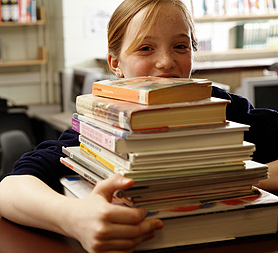Government backtracks on funding for Book Trust
As the Book Trust charity confirms the government will now help the book gifting programme continue in England, Samira Ahmed reflects on how to put a cost on the value of the scheme.

In the row that blew up over the government’s 100 per cent cull of book gifting in England through the Book Trust charity, and then its apparent u-turn yesterday after an outcry by writers, I was struck by how the programme epitomises the difficulty in measuring value rather than cost.
Writers have a vested interest, you could argue cynically, in fighting for children to be turned into book consumers.
Giving free books to affluent families seems an obvious indulgence in an age of austerity. In chapter five of the bestselling Freakonomics, Levitt and Dubner’s behavioural economics analysis on “What makes the perfect parent?” found that having many books in the home was a more relevant factor to predict a future success, than whether the child’s parents read to him nearly every day.
(Their point was that social background was more important, than literally how many times you were read to or taken to museums.)
But then how many of the politicians, bloggers and journalists pontificating about the Book gifting programme have directly experienced it with their baby? This journalist, for one.
I can still remember that moment in the basement baby clinic in 1999 when the health visitor handed over the hardboard book about bears needing hugs, in the thick cloth supermarket sponsored bag. She had a pained look and a weary smile as she warned me of the strangling hazard posed by the bag’s long handles.
As an English graduate I had a pained look about the twee subject matter and illustrations. Parents with no English, young teenage parents with no earnings, we all sat together in the same room with our squealing babies. We all got the same book.
The gesture was hugely significant. (and the book turned out to be good after all). Like child benefit the universal nature of the book gifting programme is its most important statement. I am looking at my first letter from the DSS in October 1999 as I write this, and I remember how I felt.
An educated, middleclass woman, at home without social status or income for the first time, my body transformed by childbirth, breastfeeding and sleep deprivation; here was the government sending a recognition that raising children mattered to society.
£14.40 a week went into my bank account, not my husband’s. The book came to my son along with his immunisations; an investment in his future.
There is an argument for means testing child benefit, though it is one the government has failed to fully explore. But it is not quite the same for book gifting. Giving every parent a copy of the same book for their child was an official statement about the universal social value of family time; not just literacy. (How do you put a monetary value on storytelling at bedtime?)
To hand out copies in the baby clinic only to the parents on benefits, would have immediately created a stigma; that some were deemed failures or problems. They might reasonably view it as patronising.
Eleven years on, I still have the bag (to shop with in my lunch hour) and the book.
My son has avoided any accidents with the bag handles, and is a fan of Artemis Fowl and Alex Rider. His nine year old sister did not get a free book, but she is into Laura Ingalls Wilder like her mother. I still read to them when I can. A top tip is to keep reading after they can do it for themselves, but to read other stuff, they would not manage yet. (In our house that is currently a combination of the Old Testament and Private Eye).
While there is much sanctimonious talk from opponents of the coalition about the government supposedly knowing the cost of everything and the value of nothing, Michael Gove’s “A Christmas Carol”-like change of heart on Boxing Day morning, on funding for the Book Trust’s Book gifting programme in England, suggests there is recognition of those issues. But there will be more challenges like this ahead.
They require from David Cameron and his government a more instinctive sense of civic values, and the input of the people who know what they are for, currently all too often missing from discussions about the Big Society – senior citizens, people with disabilities, women and young people.
Follow Samira on Twitter @SamiraAhmedC4
-
Latest news
-
Year of civil war in Sudan ‘a nightmare of hunger and displacement’4m

-
Israel fears repeat Iran attack, says former editor of Jerusalem Post4m

-
How long could it take to clear the Rwanda asylum seeker backlog?3m

-
Rwanda asylum boost for Sunak as bill expected to become law2m

-
Donald Trump trial: day one of historic Stormy Daniels court case4m

-




